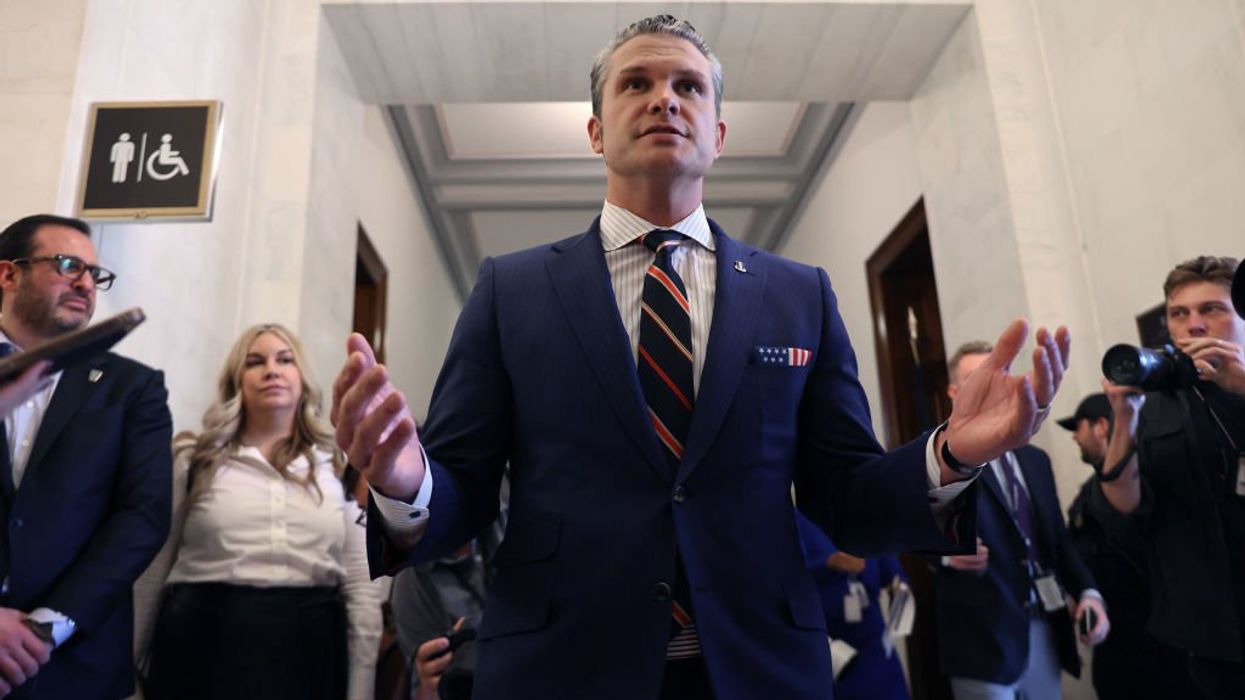© 2024 Blaze Media LLC. All rights reserved.
Editor’s note: The Blaze is featuring some guest posts to help our readers gain a deeper understanding of the situation in Egypt. This post is by veteran journalist Bill Tucker.
Riots in Egypt and the toppling of a dictator. Unrest spreading through the Middle East as calls for a united Islamic Republic or Caliphate are heard from radical leaders in Egypt, Iran and Syria. We have watched in this country from a position of detached interest, concerned yet comforted by the fact that half a world separates us from the actual strife. Or does it?
There is growing evidence that the most serious threat to America by Islamic extremists resides literally at our back door.
The U.S. border with Mexico has long been known as the pathway of entry for illegal aliens unlawfully entering America in search of work. Now, something more nefarious is finding its way inside. In late January, a book celebrating Iranian suicide bombers, “In Memory of our Martyrs”, was found in the Arizona desert just north of the border with Mexico. There was very little reporting about this find. The Department of Homeland Security refused to release even a picture of the book. William La Jeunesse of Fox News broke the story on January 27. As a result of his reporting, we know that the book was published in Iran and that it contained biographies of suicide bombers and how they died along with letters written by them to their families. Other media chose to ignore the find.
The day after Fox News broke the story, the British newspaper the Daily Mail reported that U.S. Border Guards had caught a controversial Muslim cleric being smuggled in to the United States in the trunk of a car, several hundred miles west of the suicide bomber book find. The cleric, Said Jaziri, was caught at the San Diego border crossing. His nickname is the “controversial imam”. He is banned in France and Canada. Jaziri led protests against the Danish cartoonist who dared to poke fun at Islam. He called for the death of the cartoonist. Jaziri is not a secular or moderate religious leader. He is a radical Islamist.
Officially, the U.S. government denies that there are any dots connecting terrorist organizations with drug cartels or human traffickers in Mexico. However, Representative Sue Myrick of North Carolina believes there is a connection. Last June, she sent a letter to the Obama Administration expressing her concern about possible alliances between Hezbollah and Mexican drug cartels. Included with her letter were photographs of MS-13 gang members from Mexico sporting tattoos… in Farsi.
Neither the letter nor the photographs apparently impressed the Department of Homeland Security. DHS responded that there is no information connecting Hezbollah and the drug cartels. DHS does, however, concede there is plenty of “anecdotal” evidence to connect Hezbollah members and Venezuelan officials if not to operatives in Mexico.
While American authorities seems unaware of any possible connections, the possibly has not escaped the attention of Mexican authorities. Included in the massive leak of diplomatic cables by WikiLeaks, there was this cable published in Spain’s newspaper, El Pais, under the headline, Cable sobre el acceso de EE UU a los centros de detención mexicanos. The text of the cable shows that the concern of a possible connection between terrorist organizations and drug cartels was taken so seriously in 2008 that Mexican authorities were detaining illegal aliens in Mexico for questioning about possible ties.
Last July, the Kuwaiti newspaper Al-Seyassah reported that Hezbollah employed Mexican nationals with family ties to Lebanon to help in the establishment of terror cells along the U.S. - Mexico border. Mexican authorities broke up that operation. During that same time period there was a spate of car bombings beginning Juarez. Many were detonated remotely. It was the first time the cartels had used such a tactic.
None of this should be surprising. Hamas and Hezbollah are known to have bases in South America; even American intelligence sources concede this fact. On March 3, 2010, the assistant Administrator for Intelligence of the U.S. Drug Enforcement Administration to the House Oversight and Government Reform Subcommittee on National Security and Foreign Affairs told the committee that, “Some DTOs (Drug Trafficking Organizations) based in the Tri-border Area (Brazil, Argentina, Paraguay) have ties to radical Islamic terrorist groups such as Hezbollah… There are numerous reports of cocaine proceeds entering the coffers of Islamic Radical Groups (IRG) such as Hezbollah and Hamas in Europe and the Middle East. The danger of DTO’s and IRG’s (Islamic Radical Groups) profiting from the lucrative cocaine trade can lead to an unlimited source of cheap and easy revenue to carry out potential terrorist acts. “
The growing relationships are not limited to drugs and terror; they also include guns and butter. Last fall, it was reported that Iran will build a military base in Venezuela and on that base Iran will place medium-range missiles, capable of reaching the United States. One year earlier, in September 2009, Iran and Venezuela signed energy agreements whereby Venezuela will import oil and sell gasoline to Iran if UN sanctions are imposed on Iran. In addition, Venezuela also is making investments in developing Iran’s natural gas fields.
Venezuela is not Iran’s only friend in South America. Three years ago, Iran opened embassies in Chile, Colombia, Ecuador, Nicaragua and Uruguay, and a representative office in Bolivia.
Given Iran’s growing relationships with South America and their support for terrorist organizations, the denials by the Department of Homeland Security don’t even pass the common sense test. Does DHS think that groups like Hamas and Hezbollah will restrict themselves to South America when there is money and opportunity further north in Mexico? Worse, does DHS not believe the terrorists have us in their sites? Mike Cutler, a retired special agent with the DEA and ICE is confounded by the refusal to admit there is a growing problem of cooperation between terrorist groups and drug cartels in Mexico. Cutler, understandably, sees the groups as serous threat to our national security. He refers to DHS as the Department of Homeland Surrender.
There is little doubt of a thriving cooperation between the drug cartels and terrorists among the men and women who guard our border. T.J. Bonner is the president of the union of the Border Patrol guards. Bonner points to the complex and increasingly sophisticated tunnels under the border saying he believes Hezbollah and other terrorist groups are interested in access to those tunnels. Those tunnels when combined with document mills that provide a reliable cover of disguise using false identities, allow stealth entry to people whose goal is to destroy America.
Cutler believes that the administration is choosing to ignore the evidence and choosing instead to continue to insist that our borders have never been more secure. The administration, he says, is hoping that nothing will happen. Cutler notes “Hope is not a strategy”.
Congresswoman Myrick couldn’t agree more. She sits on the House Intelligence Committee and promises there will be hearing exploring the possible connections this year.
Want to leave a tip?
We answer to you. Help keep our content free of advertisers and big tech censorship by leaving a tip today.
Want to join the conversation?
Already a subscriber?
more stories
Sign up for the Blaze newsletter
By signing up, you agree to our Privacy Policy and Terms of Use, and agree to receive content that may sometimes include advertisements. You may opt out at any time.
© 2024 Blaze Media LLC. All rights reserved.
Get the stories that matter most delivered directly to your inbox.
By signing up, you agree to our Privacy Policy and Terms of Use, and agree to receive content that may sometimes include advertisements. You may opt out at any time.


